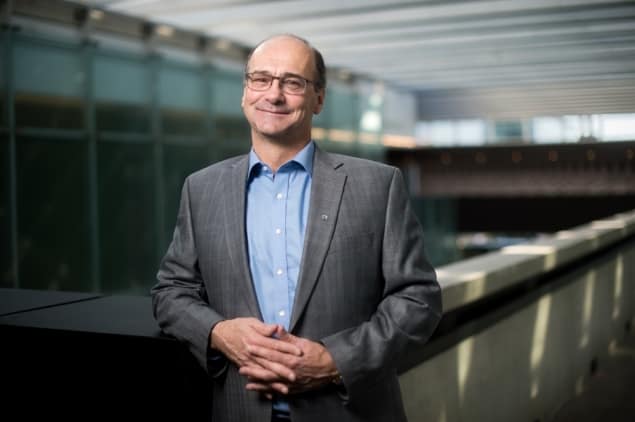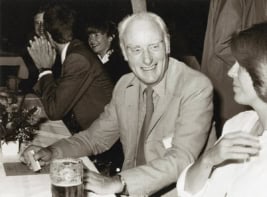
The Canadian theoretical physicist Robert Myers has today been unveiled as the next director of one of the world’s leading theoretical physics centres. Myers, 60, takes over from Neil Turok as head of the Perimeter Institute for Theoretical Physics (PI) in Waterloo, Ontario. Turok steps down after a decade leading the Canadian centre to spend more time doing research at the PI.
The PI focuses on fundamental questions in nine areas of physics including cosmology, condensed-matter physics, particle physics and quantum information. Home to more than 150 resident researchers as well as 1000 visiting scholars, the PI was founded in 1999 by Mike Lazaridis, the founder of Research in Motion — the company that made the Blackberry wireless handheld devices.
Perimeter is fortunate to have a respected, dedicated scientist and likeable person like Myers as its new director
Donna Strickland
Founded in 1999, the PI’s research programme began in 2001 with nine scientific staff, soon expanding to 24 by the end of the year. In 2004, the institute moved into its now iconic premises but the PI’s first executive director Howard Burton left suddenly in June 2007 apparently after negotiations over a new contract broke down. A year later, the institute appointed the cosmologist Neil Turok, who was then at Cambridge University, as director — a position he has held for over a decade before announcing last year that he was going to step down.
Under Turok’s stewardship, the PI continued to expand. In September 2011, it opened the Stephen Hawking Centre, which doubled the size of the institute and provided a space for its Masters students. In 2017, the institute opened its Center for the Universe, which brings together researchers to deal with the huge influx of data emerging from major telescopes such as the Canadian Hydrogen Intensity Mapping Experiment (CHIME) and the Event Horizon Telescope (EHT).
The next phase
Myers’ areas of expertise include black holes, string theory and quantum entanglement. He received his PhD at Princeton University in 1986 and, after a stint at the Kavli Institute for Theoretical Physics at the University of California, Santa Barbara, moved in 1989 to McGill University before joining the PI in 2001. Along with the directorship, Myers will hold the BMO Financial Group Isaac Newton Chair in Theoretical Physics – a position that is supported by a C$4m endowment fund by BMO Financial Group that was made in 2011.
The Perimeter Institute is not just an institute, but a family
Robert Myers
“[Myers] is the perfect choice to lead Perimeter into the future,” says Turok, who will now lead the PI’s Center for the Universe. “He has been my closest advisor throughout my time as director and I am delighted to remain at Perimeter as a researcher with him charting the course for the institute.”
According to Lazaridis, Myers is highly respected throughout the global physics community. “We are thrilled to move into the next exciting phase of Perimeter’s evolution under Myers’ leadership,” adds Lazaridis. “He possesses the drive and vision to advance Perimeter at a particularly exciting time in the history of the Institute and of physics more generally.”
Myers already has some experience leading the PI, having served as interim director for a year following Burton’s exit and been the PI’s interim director since 1 January after Turok stepped down. “I am delighted to have the job,” Myers told Physics World. “It’s a really exciting time and I am looking forward to leading the institute.”
Myers pays tribute to Turok, who he says took the PI to the “next level”, had great ideas and a “keen eye for talent”. But given the recent expansion of the PI into new areas of research, particularly condensed-matter physics, Myers says that initially he will focus on consolidating those areas given that some are small groups. “The PI is not just an institute, but a family,” says Myers. “There are a lot of smart people here and I want to listen to what people think and not be too prescriptive about the future.”
Myers says there are many opportunities in theoretical physics, mostly thanks to the vast amounts of data that are being collected by various experiments such as CHIME, EHT and the LIGO gravitational-wave detectors in the US. Yet Myers doesn’t believe that theoretical physics is in “a deep crisis” as Turok once admitted. “Particle physics is somewhat at a crossroads,” he says. “Describing it as a crisis is slightly dramatic, but I would agree that people have been relying on the status quo for too long and relying on certain models from decades ago.”
Indeed, Myers now challenges researchers to think in new ways. “Young people are the future and we want to instil in them to question the status quo,” he adds. “After all, it is the people here that make the PI such a special place.”
A “jewel” of theoretical physics
Myers’ appointment has been welcomed by the physics community. Donna Strickland from the University of Waterloo who shared the 2018 Nobel Prize for Physics says that Myers is an “excellent choice”. “Perimeter is fortunate to have a respected, dedicated scientist and likeable person like Myers as its new director,” she adds. That is backed up by theorist Ed Witten from the Institute for Advanced Study at Princeton University, who says that Myers is an “extremely influential voice in theoretical physics” who will be a “great leader” for the PI.
The power of the blackboard
John Preskill from California Institute of Technology, meanwhile, calls the PI a “jewel” of theoretical physics. “I’m very glad to see that PI will remain in capable hands after Turok steps down as director,” adds Preskill. “Myers is a visionary physicist, a natural leader, and a great guy. I’m confident that with [his] guidance, PI will soar to even greater heights.”
Sabine Hossenfelder from the Frankfurt Institute for Advanced Studies, who spent three years at the PI, told Physics World that Myers is “highly qualified” for the role and believes he will do well. Yet she warns that regardless of how well-financed and skilled Perimeter’s scientists are, they need to be aware of biases that are currently “entirely unaddressed” in science and “stand in the way of progress”.
“I hope that the new director will take measures to limit the influence of social pressures on research decisions,” says Hossenfelder. “Scientists are not immune to social biases and this can stand in the way of scientific progress.” Hossenfelder adds that the first step “to alleviate the problem” is to raise awareness. “All researchers should have a basic education about cognitive biases and decision making in groups,” she adds. “Myers is in the position to lead the way in this. I hope he will.”




